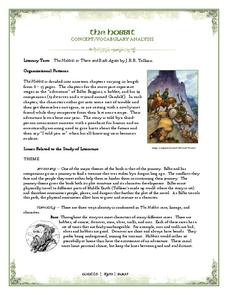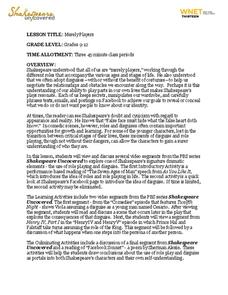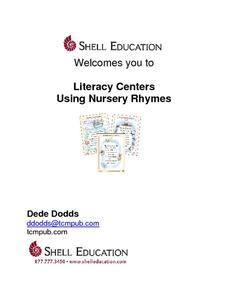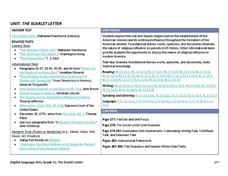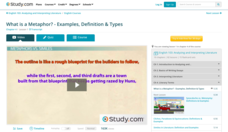EngageNY
Mid-Unit Assessment: Gathering and Using Evidence to Analyze Points of View in A Long Walk to Water (Chapter 5)
Class members discuss how culture, place, and time influence a character's identity in A Long Walk to Water by Linda Sue Park. Then, as part of a mid-unit assessment, they complete a Gathering Evidence graphic organizer to answer the...
Facing History and Ourselves
Identity and Belonging
High schoolers examine World War I war crimes. For this world history activity, students examine a painting by Ashile Gorky, a refugee from the Armenian genocide. High schoolers interpret the piece of art and discuss its historical...
EngageNY
End of Unit Assessment: Claims, Interactions, and Structure in “Is Money Affecting Your Social Status?”
It's not about the money. Scholars use the text Is Money Affecting Your Social Status? to complete their end-of-unit assessments. After finishing the assessment, they discuss how the text relates to their working definition of identity...
Novelinks
Wuthering Heights: Unsent Letters
To demonstrate their understand of the characters in Wuthering Heights and their motivations, readers assume the identity of one of the characters and write a letter to another character in the Bronte's novel.
EngageNY
Understanding Interactions: Launching Pygmalion, Part 1
During a reading of one section of Pygmalion, individuals begin thinking more deeply about identity. They also complete text-dependent questions and a close reading guide.
EngageNY
Close Reading and Summarizing: The Epilogue of Pygmalion
Moving from what to why. After completing questions over the epilogue of Pygmalion, scholars take a close look at their Eliza Character Trackers and complete part II. They have collected a lot of details about Eliza's character and now...
EngageNY
End of Unit 2 Assessment, Part 1: Drafting the Essay
Young writers use the class time to complete a draft argumentative essay. In answer to the Pygmalion end-of-unit prompt they discuss the change seen in Eliza's inner identity.
Allen & Unwin Book Publishers
In the Skin of a Monster
Kathryn Barker's In the Skin of A Monster explores how a school massacre impacts a community. Unfortunately, the events depicted are all too familiar to many. This teacher's guide for Barker's novel offers activities that enable readers...
Core Knowledge Foundation
Unit 1: Hello, Universe by Erin Entrada Kelly Teacher Guide
Erin Entrada Kelly's award-winning novel, Hello, Universe is the anchor text in this 236-page teacher guide. The guide includes introductions to the Core Knowledge Language Arts (CKLA) program and the unit, a unit calendar, 12 lessons...
Anti-Defamation League
Viewing History from Multiple Perspectives
Celebration or protest song? The full text of Woody Guthrie's "This Land is Your Land" opens a study of the Lewis and Clark Expedition, the Louisiana Purchase, and Western Expansion from various perspectives. Middle schoolers examine...
EngageNY
Analyzing Character: Launching Pygmalion, Part 2
Readers of Pygmalion use Eliza Character Tracker Parts one and two to notice and wonder about character analysis. They read text excerpts and mark details that show how Eliza feels and why she acts in certain ways. To finish, they answer...
Annenberg Foundation
Rhythms in Poetry
Rhyme, rhythm, free verse, imagery: Do these words describe poetry, or jazz music? The answer is both! A resource explores these similarities as scholars watch a video, engage in discussion, read author biographies, write poetry and...
Core Knowledge Foundation
Genetics and the Master Race
How did the beginnings of genetic research influence the Nazi party? A thorough, engaging unit incorporates the work of Gregor Mendel, the study of inherited traits, and the use of racism and discrimination during the Holocaust.
Novelinks
The Hobbit: Concept/Vocabulary Analysis
Considering using Tolkien's The Hobbit for book circles or whole-class reading? Check out this packet that provides an overview of the novel, some interesting background materials, and links to additional resources.
Curated OER
What is Theme?
What is theme, and how can you find themes in literary works? These and other questions are answered by a colorful and engaging presentation that not only defines the term but also provides easy to understand examples. The slides...
Curated OER
Merely Players
Disguises and role playing are the focus of a resource that uses Shakespeare’s As You Like It, Twelfth Night, and Henry IV, Part I, to demonstrate how we all play many parts in our lives; how we all are “merely players.” The many...
Curated OER
Literacy Centers Using Nursery Rhymes
And in this corner we have Little Jack Horner. Engage your learners with phonemic awareness activities that encourage them to play with language. Eight different categories of phonemic awareness activities are detailed in the resource...
Louisiana Department of Education
The Scarlet Letter
Use Nathanial Hawthorne's immortal text on the influence of religion on the early American settlements, as well as its continued impact on American culture, with a unit that focuses on The Scarlet Letter. In addition to Hawthorne's...
The New York Times
Literary Pilgrimages: Exploring the Role of Place in Writers’ Lives and Work
Do the places you have lived influence what you write? Class members research the lives of writers and look for how places these writers have lived might have influenced their writings.
National Museum of the American Indian
To Honor & Comfort Native Quilting Traditions
"Native American history leaps boldly off the colorful quilts and patchwork designs." Learners discuss Native American identity and symbolism by reading about a variety of Native quilters and their unique art process, and participate in...
Curated OER
During Reading Strategy for Charles Dickens’ Great Expectations
Readers create a literary scrapbook for one of the characters in Charles Dickens' Great Expectations and fill it with mementoes, journal entries, letters, etc. A great way to get kids to think about characterization.
Curated OER
Allusion and Illusion: Definitions and Examples
Illusions and allusions certainly sound similar but there is a world of difference in their meanings. The narrator of this short video distinguishes between these terms, defines them, and offers examples that are sure to engage viewers....
Curated OER
What is a Metaphor? - Examples, Definition & Types
Metaphors, the definition of, types of, and examples of, are the subject of a short video that models for viewers this grand poobah of literary terms. Colorful images and animations are used to illustrate the connections between...
Curated OER
Poetry Passport
Passport photos are notoriously unflattering but here's an activity that encourages youngsters to create a poetic picture of themselves using each category on the passport as a prompt for a poem.
Other popular searches
- Visual Art Self Identity
- Art Project Self Identity
- Self Portrait Identity Art
- Art Mural Self Identity
- Art Self Identity
- Self Identity and Art
- Australian Art and Identity
- Identity Art Self Portrait
- Language Arts Identity
- Art Identity
- Clay Art Identity
- Visual Art Identity















